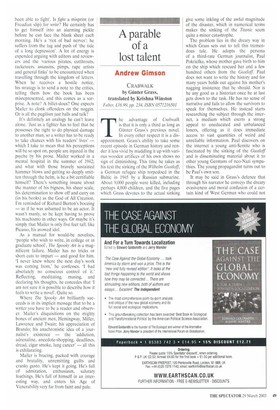A parable of a lost talent
Andrew Gimson
CRABWALK
by Gfinter Grass, translated by Krishna Winston Faber, £16.99, pp. 234, ISBN 0571216501 PT'S he advantage of Crabwalk
is that it is only a third as long as GUnter Grass's previous novel.
In every other respect it is a disappointment. Grass's ability to take some recent episode in German history and render it less vivid by muddling it up with various wooden artifices of his own shows no sign of diminishing. This time he takes as his text the sinking of the Wilhelm Gustloff, a German refugee ship torpedoed in the Baltic in 1945 by a Russian submarine. About 9,000 people were killed, including perhaps 4,000 children, and the five pages which Grass devotes to the actual sinking give some inkling of the awful magnitude of the disaster, which in numerical terms makes the sinking of the Titanic seem quite a minor catastrophe.
The problem lies in the dreary way in which Grass sets out to tell this tremendous tale. He adopts the persona of a third-rate German journalist, Paul Pokriefke, whose mother gave birth to him on the ship which rescued her and a few hundred others from the Gustloff. Paul does not want to write the history and for many years holds out against his mother's nagging insistence that he should. Nor is he any good as a historian once he at last gets down to the task. He has no sense of narrative and fails to allow the survivors to speak for themselves. He instead starts researching the subject through the internet, a medium which exerts a strong appeal to uneducated and unbalanced loners, offering as it does immediate access to vast quantities of weird and unreliable information. Paul discovers on the internet a young anti-Semite who is fascinated by the sinking of the Gustloff and is disseminating material about it to other young Germans of neo-Nazi sympathies. The young propagandist turns out to be Paul's own son.
It may be said in Grass's defence that through his narrator he conveys the dreary evasiveness and moral confusion of a certain kind of West German who could not bear to look into the recent past. But the lesson he suggests is worse than that. He implies that those young Germans who do develop an interest in the horrendous sufferings of their grandparents' generation as the Red Army drove westwards at the end of the war are themselves likely to harbour malign political views, extending to a
desire to murder Jews. Instead of a novel or a straight piece of history, we are fobbed off with a trite parable. Grass long ago lost his muse and set himself up as a political commentator, hut the brutish, nerdish and philistine world of neo-Nazi youth is one on which a civilised old poseur such as himself can shed no light.









































































 Previous page
Previous page